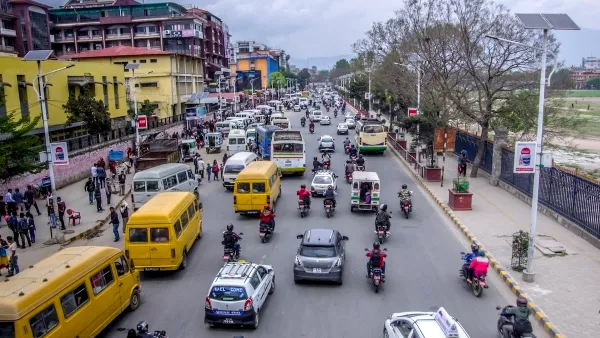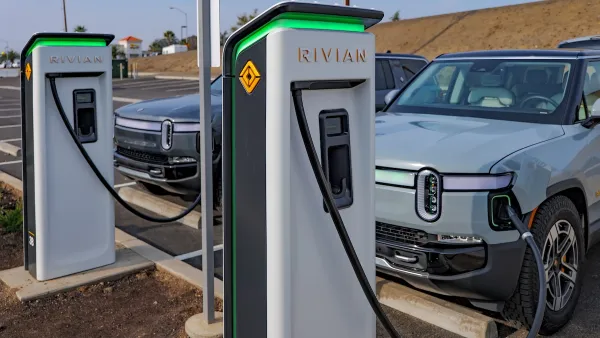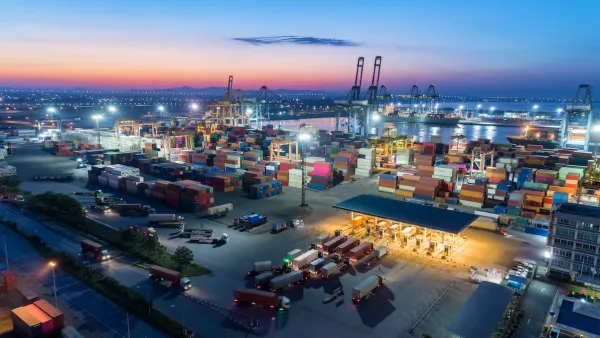Under the Kyoto Protocol, developed countries set targets for cutting carbon emissions relative to 1990 levels by 2012. As the globe gathers to discuss extending the expiring agreement, Duncan Clark examines its effectiveness.
In these first two charts produced by Clark that show the gap between each nation's percentage target and actual percentage change between 1990 and 2010, he finds that "there are more successes than failures and the sum of emissions from nations with Kyoto targets have fallen significantly." European countries appear to have performed well in reducing their carbon footprint, but "[t]he European picture is more complex than these charts suggest because under the European Trading Scheme companies across the continent can trade emission permits between each other. Once these traded emissions are taken into account some countries move around - most noticeably Italy which switches from being ahead of its target to substantially behind."
Meanwhile, the third chart shows that the increase of carbon emissions in the rest of the world, particularly China and other emerging economies, have nullified the success of European countries. It is important to note that this growth is largely driven by the production and export of goods to developed nations, which undermines the impact of Kyoto on a global scale. "According to one study I reported on last year," adds Clark, "when you look at total carbon footprint of each nation (including imports and excluding exports), the progress made under Kyoto looks extremely poor, with Europe's savings reduced to just 1% from 1990 to 2008 and the developed world as a whole seeing its emissions rise by 7% in the same period."
The last chart shows that global carbon emissions have been increasing steadily over the past decade with no sign of slowing down. "In that sense, the Kyoto protocol has been a failure," admits Clark. "But it was unquestionably an important first step in global climate diplomacy. The question is whether a more ambitious second step will follow in time to avoid unacceptable risks of devastating climate change."
FULL STORY: Has the Kyoto protocol made any difference to carbon emissions?

Planetizen Federal Action Tracker
A weekly monitor of how Trump’s orders and actions are impacting planners and planning in America.

Maui's Vacation Rental Debate Turns Ugly
Verbal attacks, misinformation campaigns and fistfights plague a high-stakes debate to convert thousands of vacation rentals into long-term housing.

San Francisco Suspends Traffic Calming Amidst Record Deaths
Citing “a challenging fiscal landscape,” the city will cease the program on the heels of 42 traffic deaths, including 24 pedestrians.

Defunct Pittsburgh Power Plant to Become Residential Tower
A decommissioned steam heat plant will be redeveloped into almost 100 affordable housing units.

Trump Prompts Restructuring of Transportation Research Board in “Unprecedented Overreach”
The TRB has eliminated more than half of its committees including those focused on climate, equity, and cities.

Amtrak Rolls Out New Orleans to Alabama “Mardi Gras” Train
The new service will operate morning and evening departures between Mobile and New Orleans.
Urban Design for Planners 1: Software Tools
This six-course series explores essential urban design concepts using open source software and equips planners with the tools they need to participate fully in the urban design process.
Planning for Universal Design
Learn the tools for implementing Universal Design in planning regulations.
Heyer Gruel & Associates PA
JM Goldson LLC
Custer County Colorado
City of Camden Redevelopment Agency
City of Astoria
Transportation Research & Education Center (TREC) at Portland State University
Jefferson Parish Government
Camden Redevelopment Agency
City of Claremont





























